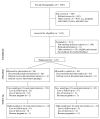Participant recruitment and retention in a pilot program to prevent weight gain in low-income overweight and obese mothers
- PMID: 19930587
- PMCID: PMC2785793
- DOI: 10.1186/1471-2458-9-424
Participant recruitment and retention in a pilot program to prevent weight gain in low-income overweight and obese mothers
Abstract
Background: Recruitment and retention are key functions for programs promoting nutrition and other lifestyle behavioral changes in low-income populations. This paper describes strategies for recruitment and retention and presents predictors of early (two-month post intervention) and late (eight-month post intervention) dropout (non retention) and overall retention among young, low-income overweight and obese mothers participating in a community-based randomized pilot trial called Mothers In Motion.
Methods: Low-income overweight and obese African American and white mothers ages 18 to 34 were recruited from the Special Supplemental Nutrition Program for Women, Infants, and Children in southern Michigan. Participants (n = 129) were randomly assigned to an intervention (n = 64) or control (n = 65) group according to a stratification procedure to equalize representation in two racial groups (African American and white) and three body mass index categories (25.0-29.9 kg/m(2), 30.0-34.9 kg/m(2), and 35.0-39.9 kg/m(2)). The 10-week theory-based culturally sensitive intervention focused on healthy eating, physical activity, and stress management messages that were delivered via an interactive DVD and reinforced by five peer-support group teleconferences. Forward stepwise multiple logistic regression was performed to examine whether dietary fat, fruit and vegetable intake behaviors, physical activity, perceived stress, positive and negative affect, depression, and race predicted dropout as data were collected two-month and eight-month after the active intervention phase.
Results: Trained personnel were successful in recruiting subjects. Increased level of depression was a predictor of early dropout (odds ratio = 1.04; 95% CI = 1.00, 1.08; p = 0.03). Greater stress predicted late dropout (odds ratio = 0.20; 95% CI = 0.00, 0.37; p = 0.01). Dietary fat, fruit, and vegetable intake behaviors, physical activity, positive and negative affect, and race were not associated with either early or late dropout. Less negative affect was a marginal predictor of participant retention (odds ratio = 0.57; 95% CI = 0.31, 1.03; p = 0.06).
Conclusion: Dropout rates in this study were higher for participants who reported higher levels of depression and stress.
Trial registration: Current Controlled Trials NCT00944060.
Figures
References
Publication types
MeSH terms
Associated data
Grants and funding
LinkOut - more resources
Full Text Sources
Medical


